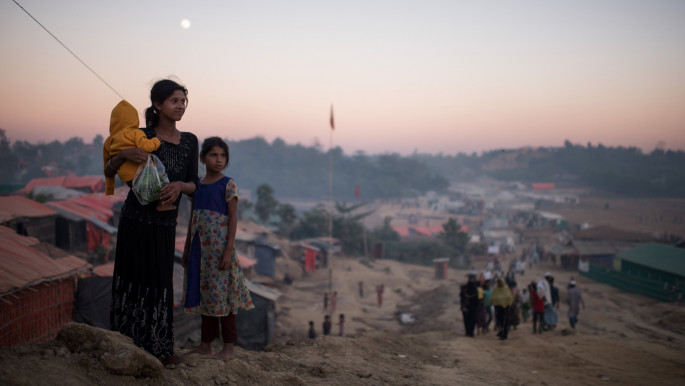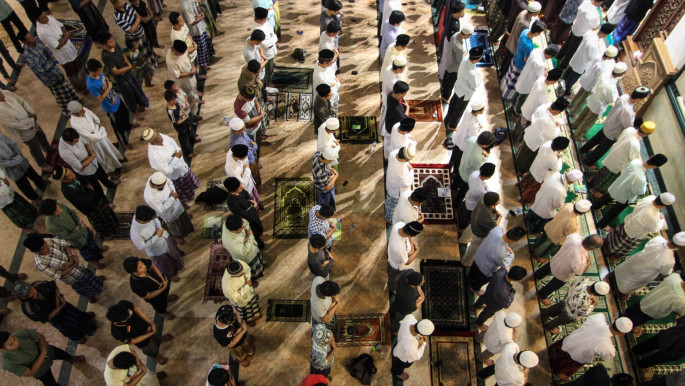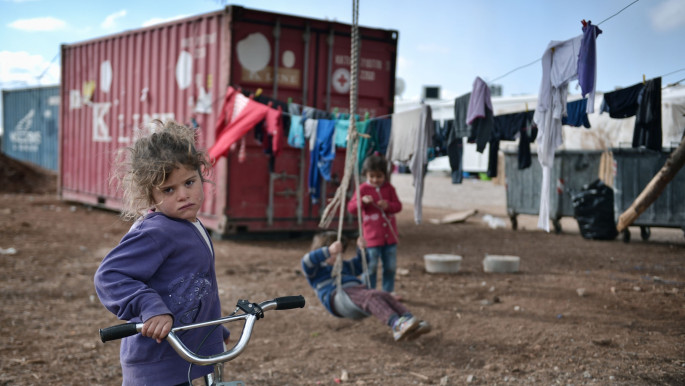For Rohingya refugees, Ramadan under lockdown offers little respite from hardships of life
As Ramadan begins in a climate of lockdown, the next 30 days will challenge millions of Muslims around the world to varying degrees – not least the 1.1 million Rohingya refugees in Bangladesh.
From praying in secret under Myanmar's military crackdown - to praying in solitude in the age of coronavirus - observing the rituals of Ramadan will be no easy feat.
At Kutapalong refugee camp in Cox's Bazar, Bangladesh, temperatures are soaring. There is barely any shade, and trees have been chopped down to create shelters at the densely packed makeshift camp.
With markets closed and food distribution systems affected, the challenge of observing Iftar — the sunset meal for breaking each day's fast — will be heightened this Ramadan.
Along with the rules of social distancing, it is not the ideal environment for observing rituals of the holy month. And for Rohingya who spoke to The New Arab, there are evident challenges to fasting the entire day in squalid conditions under a baking sun before settling to break bread.
But the feeling of joy that Ramadan is said to bring has been replaced by a feeling of abject sadness right across the camp as people brace themselves for the month ahead.
 |
|
| Read more: Internet ban spreads coronavirus fears faster than infection at Rohingya refugee camps |
"We panicked when we first heard about the epidemic. It's a serious moment. Ramadan is compulsory for every Muslim; we must worship, fast and carry out the Taraweeh prayer," Rohingya Youth Association worker Ali Jinnah Hussain told The New Arab. "How can we perform these duties in this strict blockade?"
He said it will be difficult for the Rohingya to accept that they cannot gather to pray and observe Iftar as a community. In addition to this challenge, there is also a lack of rations. "The World Food Program (WFP) has reduced the distribution of rations instead of making it a priority," he said.
And with mosques closed, for those who spend up to 10 days sleeping and praying inside them, lockdown will impact almost every aspect of Ramadan rituals.
WFP spokesperson Gemma Snowdon told The New Arab that "temporary changes" to food distribution were crucial to "mitigate the risk of Covid-19 in the camps."
This means that during the month of Ramadan, while quantities of food in pre-packed rations have been increased, families can only queue for rations just once a month.
Snowdon said the food packages include double portions of yellow split peas, in addition to chickpeas, potatoes, rice, eggs, spices, oil and vegetables.
 |
The feeling of joy that Ramadan brings has been replaced by abject sadness in Rohingya refugee camps |  |
She added that in order to implement "physical distancing," the number of people allowed to queue for food each day has also been reduced from more than 1,000 to a maximum of 500 people.
"The decision to change food distributions to pre-packaged rations, especially as Ramadan approached, was not an easy one, but it was necessary," Snowdon said.
Read more: Spiritual lockdown: Lebanon's Muslims prepare for a tough Ramadan, but there's a silver lining
"The WFP, above all, recognises the important role food plays, not just in daily life, but in religious and cultural occasions. And Ramadan will look different for people all over the world, including the refugee camps of Cox's Bazar. The changes we've made are temporary, but the uncontained outbreak of Covid-19 in the camps would be long-lasting."
Ali Mullah, 26, said his mother is afraid each time he leaves their shelter. "She cries a lot. Mosques are closed, so she said we will pray five times a day at home for Ramadan."
 |
|
| Read more: Muslims in Asia brace for Ramadan in the shadow of coronavirus |
But he said he is having a difficult time on many levels, thinking about his girlfriend who he lost along the way during the exodus from Myanmar when they became separated and she was not able to leave.
Others, including 23-year-old Mohammed Aziz Ullah are also feeling deflated. "We have been planning Ramadan for months but with the lockdown at the refugee camp, I can't go outside to work, and if I can't do this, how can I prepare for Iftar? It's very difficult for innocent Rohingya people who have already suffered so much."
Read more: Coronavirus highlights desperate plight of Syrian prisoners in Assad's jails
Ro Mohammad Faruque, 26, lives in a tiny shelter at the camp with 10 members of his family. He said they were now "facing a double crisis with internet restrictions and the coronavirus lockdown."
He said the challenge of Ramadan will be heightened in the current environment with "not enough drinking water due to dysfunctional tube wells and broken viaducts which require repair." He said the lack of volunteers meant the environment was "unclean", as seen by the overflow of waste-bins, tanks, latrines and pits.
 |
Everyday is spent in panic. There is a food crisis in the camp, and also in my village. We do not know what will happen during Ramadan |  |
Faruque said the Rohingya will face "these same hardships during Ramadan," making it difficult to fast. "Ramadan is compulsory for us but we cannot escape."
"I have faced lots of difficulties and tragedies in my life and I am still going through many. I have been struggling like a fish out of water, but those tough times taught me many lessons and made me stronger. Emotionally, I got broken inside due to depression and lack of support."
During his conversation with The New Arab, Faruque said he had to go because "police are roaming here, so I can't stay here anymore time to use WiFi."
 |
|
| Read more: 'Catastrophe is coming': Disaster looms as coronavirus reaches Greek refugee camps |
Ramadan this year will be different not just for the Rohingya in refugee camps, but also for millions across Bangladesh — including 29-year-old land worker Raju Ahmed. "The coronavirus situation is getting worse day by day," he told The New Arab.
"Everyday is spent in panic. There is a food crisis in the camp, and also in my village. We do not know what will happen during Ramadan. My parents are very worried, there is no work at the moment, money is almost over. I do not know what to do."
Ahmed's situation is a stark contrast to that of 25-year-old Chittagong-based law graduate Adibur Rahman. The son of a former businessman-turned-philanthropist, Rahman said coronavirus does not discriminate, but his position does make it easier to do deal with.
"We are privileged but there are many people who are suffering a lot right now. Poverty is rising, so is the price of food, which makes it more difficult for so many people, especially now at this time of Ramadan."
He said with transportation of food limited, the cost of a chicken this week was almost double the usual price at 580 Taka (£5.54).
Coronavirus could not have arrived at a worse time for millions of Muslims marking Ramadan - in particular, those struck by deplorable poverty - whether dwelling in the slums of cities, or in the squalor of refugee camps everywhere.
Anu Shukla is a freelance journalist based in London
Follow her on Twitter: @AnuShuklaWrites







 Follow the Middle East's top stories in English at The New Arab on Google News
Follow the Middle East's top stories in English at The New Arab on Google News


